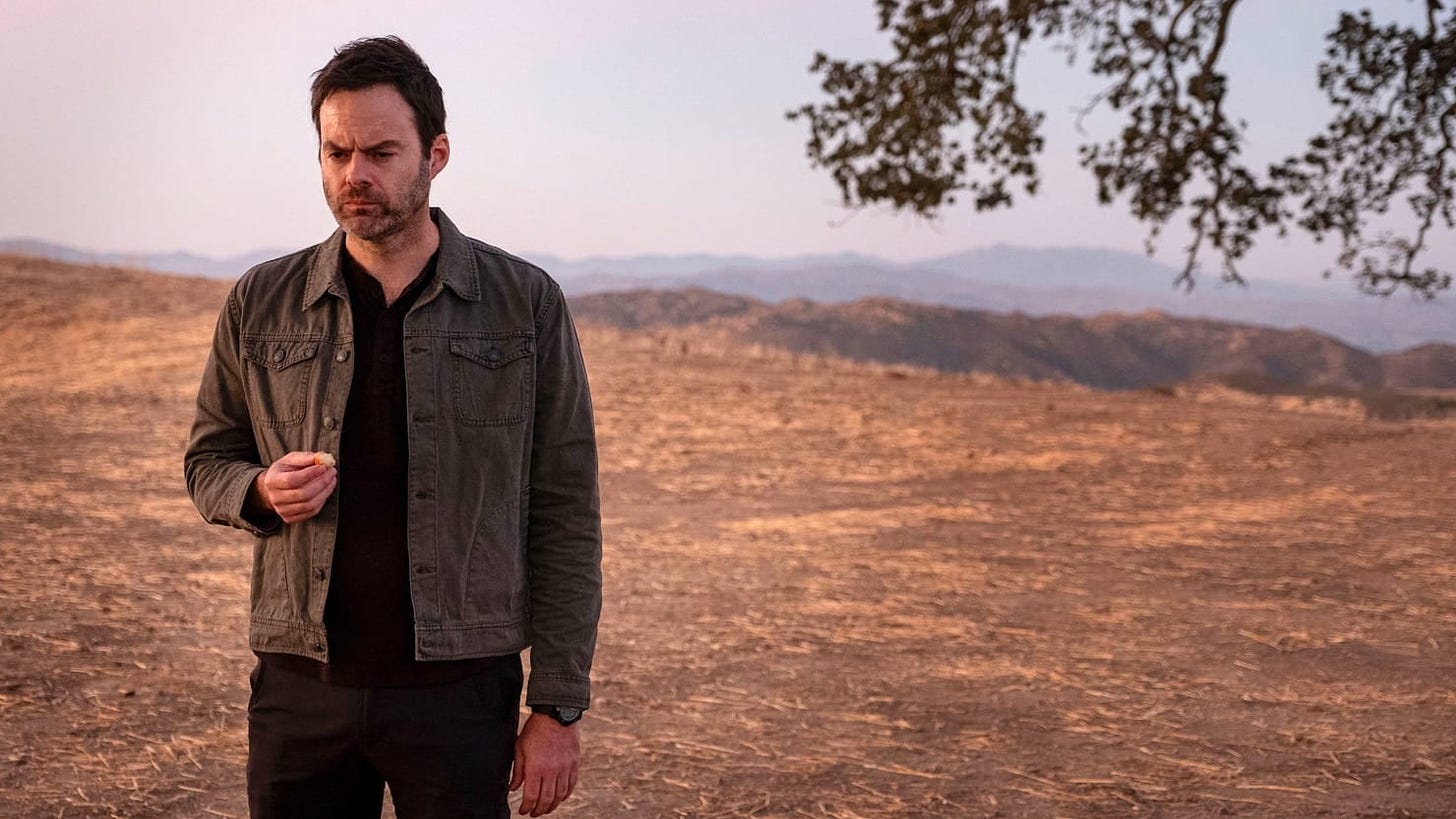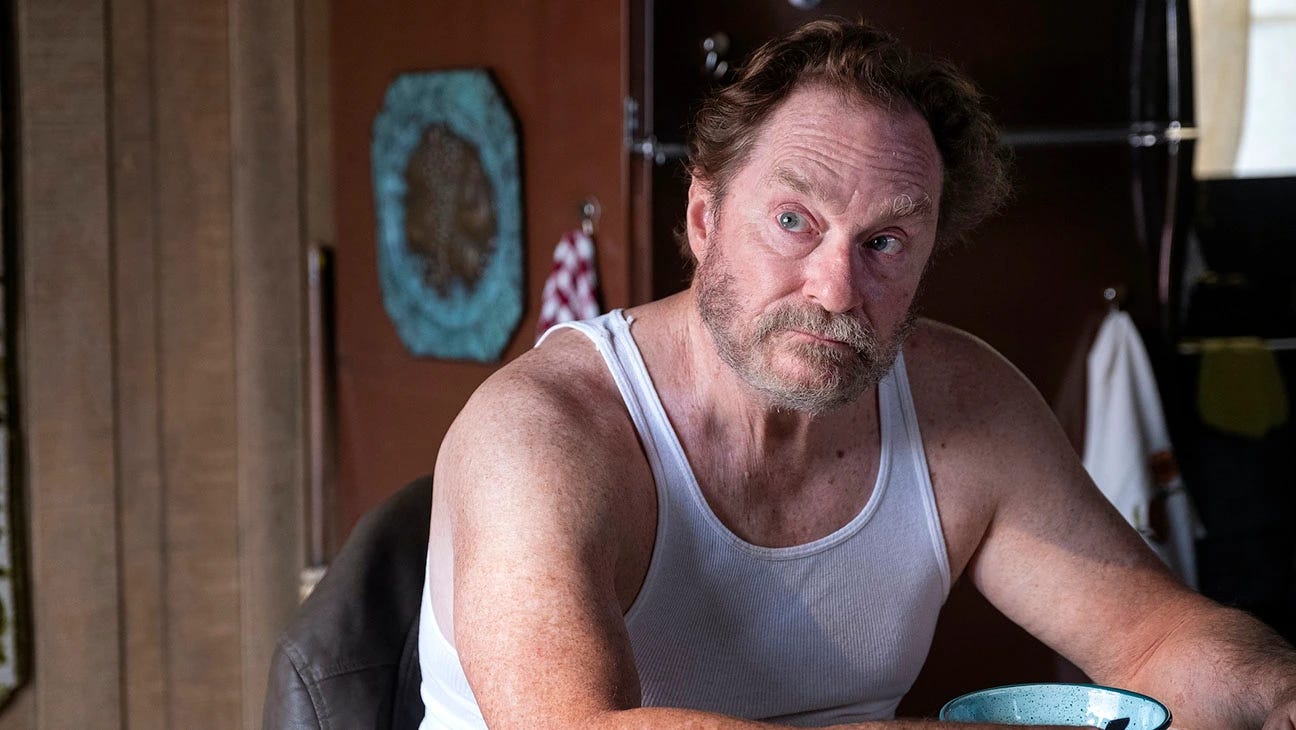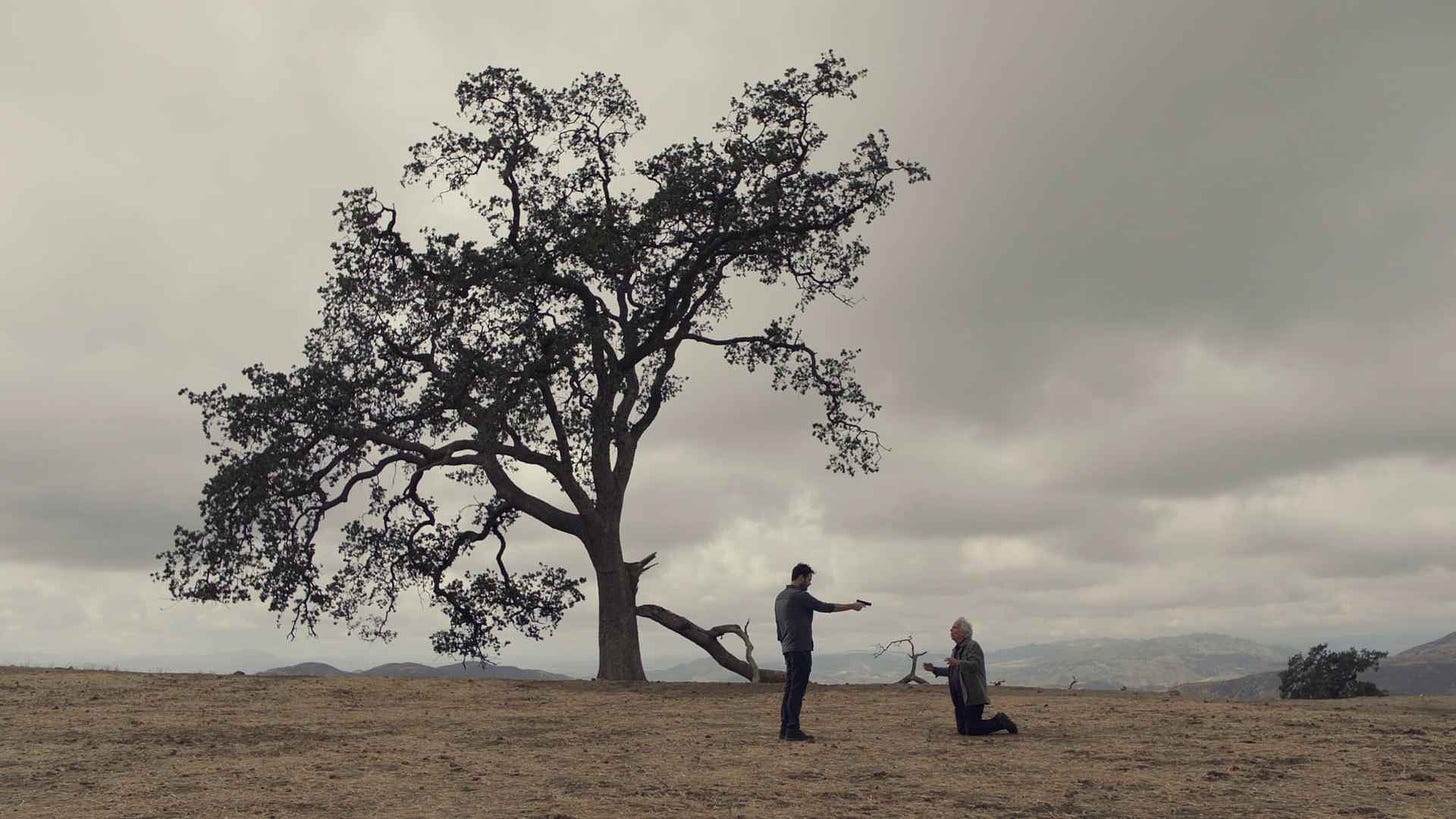[Disclaimer: As a TCM employee, I work for the company that airs Barry, Warner Bros. Discovery]
The following contains spoilers for the first three seasons of Barry.
“There’s no forgiving Jeff!” Barry Berkman (Bill Hader) shouts after executing both his target and the client during a job. After the fallout of Season 2 that saw Barry break from his handler Fuches (Stephen Root), murder an entire monastery full of criminals, and have his father-figure/mentor/acting coach Gene Cousineau (Henry Winkler) discover that Barry murdered Gene’s girlfriend, Detective Janice Moss (Paula Newsome), who found out Barry’s secret life as a hitman, Barry is in a bad place. With the acting school closed down and feeling adrift, Barry takes random hit jobs, and in this job in particular, he’s hired to murder Jeff, who had been sleeping with the client’s wife. As Barry prepares to finish the job, the client tells Barry that he and Jeff have patched things up. Barry doesn’t accept it and kills them both. In an interview with my pal and former Collider colleague Adam Chitwood over at TheWrap, Hader explained, “Yeah it’s essentially Barry killing the very idea of forgiveness.”
Later in the episode, Hader tries to get work from his associate NoHo Hank (Anthony Carrigan), but NoHo stresses that given all the havoc created by Barry, he can’t just be invited back in. “Forgiveness must be earned,” NoHo says to Barry. So Barry, in his weird, binary, anti-social way, thinks he simply has to get Gene to forgive him, but also if he gets Gene an acting job, that will make them square and repair their broken bond. Barry is a monster, but he’s also one that sees the world in childishly simple terms, which is why the show’s conceit about him wanting to be an actor is so genius: what if you could flip a switch and be someone else?
The switch flip (culminating in the Season 3 finale, “starting now”) is what all characters are trying to pursue this season. Everyone is tossed around by these dramatic, sudden shifts where their lives are upended in a single moment, much like the trauma they’re facing. That’s the unfairness of it all: destruction takes a moment, but creation or restoration is hard, painful work. There’s no switch to flip, but so many characters are looking to be made whole this season, and it’s typically through seeking forgiveness or through vengeance. The season’s tragedy is that neither forgiveness or vengeance is possible. The best we can hope for is a loose approximation of something approaching justice.
Forgive Me
To understand where Barry ends up in Season 3, you have to look at the three things that make the character work so well. First is not only Hader’s performance but what he carries with him into the role. Before Barry, Hader was largely known for comedy, especially the broad comedy of Saturday Night Live that had him doing impressions or playing memorable characters like Stefon. His persona is someone who seems generally likable and he’s also a huge film nerd. That creates a tension from his performance on Barry, where Barry seems like an affable dude to knowing that he murdered his friend Chris (Chris Marquette) in cold blood because Barry had to keep his life as a hitman a secret. That’s not to mention the rage that tends to bubble up in the character from time to time and Hader can show how frightening he can be. The second part of what makes the character work so well is that it’s kind of a reverse-Walter White (Bryan Cranston) of Breaking Bad. Walter’s arc is about a good man becoming deeply evil. For Barry, he’s an evil guy who thinks that he can become good, and all that takes is switching from one profession (murdering people for money) to another (acting).
The most important part is that Barry lacks self-awareness. What makes Barry excel as a hitman is that he refuses to look at his inner life. He doesn’t wrestle with a conscience as much as trying to avoid consequences. While Barry may not be a sociopath who enjoys killing, he also tends to view it as inconvenience, like having to run an errand. In Season 3, when Sally cries to Barry that her show, Joplin, has been canceled because the head of the streaming network listened to the algorithm, Barry thinks he’s being helpful when he offers ways that they can psychologically torture the executive. It’s not that Barry thinks this kind of torture is “good” or “bad”, but it is a solution. That’s how Barry views the world: If I do “X”, I will get “Y”. Which leads us to Barry’s quest for “forgiveness” in Season 3.
The worst thing NoHo Hank could have told Barry is that “Forgiveness has to be earned,” because Barry understands the world through a transactional lens. Barry can’t comprehend the feelings of others1, so he doesn’t start from a place of remorse. He starts from “how can I solve this problem,” and NoHo offers him the solution of “earn forgiveness.” From there, Barry sees a way out of his downward spiral as simply getting Gene a film or TV part, not realizing that Gene has burned so many bridges that the only way it was ultimately possible was pitching a narrative that Gene had “saved” war veteran Barry with acting. Eventually, Barry decides to let Gene be, and Gene tries to pay it forward with the same mistake—that forgiveness for past transgressions can be earned without personal hardship or restitution. When Gene wants Annie (Laura San Giacomo) to direct his Masterclass series and give her 100% of the profits, it’s completely disconnected from his past transgressions. Blackballing her for 30 years doesn’t change anything other than making Gene feel a little better about himself, but it’s not justice and it’s pretty clear that Annie doesn’t forgive Gene, but she’ll take advantage of his guilty conscience.
None of this is “forgiveness.” At best, it’s a child’s concept of forgiveness where if I wrong you and then I say, “I’m sorry,” you then forgive me, and everything is okay again. Barry exists in the realm of deep trauma. These aren’t slights; these are gaping wounds, whether it’s murdering a loved one or killing someone’s career. What’s broken here cannot be fixed, and even the act of seeking forgiveness may be folly. But we don’t want to live with our pain, so we try to cure it with forgiveness as a way to ease a troubled conscience. It doesn’t work, but it’s a tempting idea that through a kind act we can balance the ledger.
So what about those who are in the red? Vengeance comes from the opposite side of forgiveness. It’s a way of trying to restore balance, and rests on the same transactional ideology.
Vengeance Isn’t Mine
If Barry’s quest through Season 3 is to seek forgiveness, then Fuches spends Season 3 looking for vengeance and his poisonous need for it infects almost everyone he touches. One of the funniest parts of Season 3 is how vengeance completely consumes Fuches. He’s given heaven-on-Earth twice, and both times refuses it because he needs Barry to die, and he can’t pull the trigger himself. His strategy throughout the season is to find the families of Barry’s victims and hope that they’ll do his dirty work for him.2 Of course, with Fuches being woefully inept and yet enamored of his own perceived brilliance, none of this goes according to plan.
Gene tries to kill Barry in the Season 3 premiere only to have the gun fall apart in his hands. A mother and son plan to kill Barry only to have the gun go off in the mother’s hands and shoot her son in the passenger seat. The two rush off to the hospital never to be seen again. Chris’ wife poisons Barry, but it doesn’t finish the job, and a near-death Barry escapes her home only to be found by the father of Ryan Madison, the target Barry is supposed to kill in the pilot but doesn’t only because the Chechens got there first. Ryan’s father takes Barry to the hospital, but can’t live with the grief of losing his son and commits suicide. The psychopathic biker gang tries to kill Barry, but are disposed of in various ways, largely due to their own misfortune. And then there’s Jim Moss (Robert Wisdom), Janice’s father, who refuses to be Fuches’ puppet.
Barry isn’t a nihilist show, but it does see forgiveness and vengeance as the same dead ends. Setting aside Barry’s dumb luck3, vengeance gets no one anywhere closer to where they want to be. It can’t solve grief and its personal nature removes it from justice. In Season 3, Barry emphasizes that violence and grief ripple outwards, and so any attempt to personalize it ignores the larger ramifications. For any single person to kill Barry would then remove that opportunity from everyone else, so unless they get a group torture going (a la Sympathy for Lady Vengeance), they commit the same sin as Barry, which is a total indifference to how violence hollows out the grieving.
The finale also emphasizes how violence won’t make anyone whole. The resolutions of both Sally (Sarah Goldberg) and NoHo’s storylines in Season 3 are both about two people put into positions where homicide would be “justified.” Sally is attacked by a biker member, who’s looking for Barry, but needs to get her out of the way first. He almost strangles her to death (the scene is particularly hard to watch) before she stabs him in the neck and then beats him to death with a baseball bat. NoHo, despite running a criminal syndicate, is typically averse to violence, but has to shoot his way out of a Bolivian mansion to rescue his lover Cristobal (Michael Irby). In both cases, Hader (who directed the finale) makes sure to do a close-up on the character after the violence to show that Sarah and NoHo have been transformed by this violence act. The violence was necessary, but it wasn’t restorative, and unlike Barry, they know there’s no going back to a normal life.
What’s Done Is Done
The only character in Season 3 who has anything figured out is Jim. Casting Robert Wisdom was no accident because he brings a tremendous weight of emotional authority with him. Like Janice, he has to be incorruptible. When Fuches offers him the chance at vengeance, Jim proceeds to escort Fuches straight to the police station. When he confronts Gene in the season finale, he forces Gene to make a choice—he can either protect Barry or he can do right by Janice, but he can’t do both. And when Barry comes in to kill Jim, Jim doesn’t use the moment as a way to justifiably kill Barry. He has the cops there ready to take Barry into custody.
The final scene accomplishes so much with our central characters. For Barry, it shows that forgiveness is pointless. He’s confronted by Albert (James Hiroyuki Liao), who served with Barry in Afghanistan and acknowledges that he owes Barry a debt because Barry’s actions allowed Albert to come home and have a family. Albert shows mercy to Barry, but stresses (in an echo of Barry’s empty promise to himself in the Season 1 finale) that the violence ends “starting now.” In this moment, Barry is in his most vulnerable position and unable to account for taking the life of an innocent like Chris, but in typical Barry fashion he gets another chance. And in typical Barry fashion, he blows it immediately.
He comes to what he thinks is Gene’s aide (earlier in the season he tells Gene point blank, “You’re a bad actor, Mr. Cousineau,”) only to fall for Gene’s performance, and do what he thinks he has to, which is kill. For Barry, he always reverts to murder because that’s who he is. Getting “forgiveness” isn’t going to change that because Barry’s actions are unforgivable. But Barry’s mentality is that he’s only one thing away from change. There may be a pile of dead bodies behind him, but he thinks if he can do one thing—become an actor, redeem himself in the eyes of Gene or Sarah—then he can move on.
The final shot of the season, Jim standing outside his home, framed in a window with Janice’s picture on the inside, stresses there is no moving on. Plot-wise, the Barry finale checks a lot of boxes for “justice.” Barry spent the first two seasons lying to Sarah and Gene, the two people he loves the most, and they both lie to him in the finale. Fuches, who followed the path of vengeance, ends up jail. Barry, who followed the path of forgiveness, also gets sent to jail.
But it would be a stretch to say that Jim “wins.” The final shot hammers home that his daughter is still gone. The man responsible may be going to jail, but nothing has been solved. You can’t solve grief. People who commit murder should go to jail, but that’s a societal need, not a way to flip a personal switch to acceptance. What Barry, Fuches, Fuches’ vengeance army, and Gene fail to understand is that we can’t fix what’s broken. We simply have to live with it.
This feels like Hader making a little dig at the acting profession, arguing that what Hollywood perceives as talent is really the ability to fit particular molds that go into a machine. Barry’s an awful scene partner, but people think his every confession of trauma (like in the pilot when he tells Gene about how his time in Afghanistan scarred him and led him to murder-for-hire) is a performance because they think acting is a solo venture rather than a collaborative feat like any other part of a production.
Of everything that happened in Season 3, this element probably made me the most uncomfortable. It’s part-and-parcel with the empty gestures of forgiveness Barry and Gene make during the season, but there’s something particularly grotesque about finding people who have suffered a great loss, and then using them as weapons in your own vendetta. Of course, grievance as a gateway to violence is nothing new, but with Fuches it feels particularly oily because he has no ideology beyond wanting to kill Barry.
I like how the show stresses that Barry isn't smart; he’s just stupidly lucky, and he’s backed into a corner when his luck runs out.






